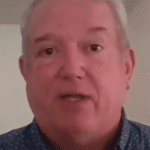
By Curt Collier
When I first joined Ethical Culture, I actually had never visited a Society, had never met an Ethical Culturist, and knew little about its rich philosophical tradition. I was completing my internship in audiology at the House Ear Institute in Los Angeles when my professor called to say that the doctoral candidate the department had hoped to hire to teach that fall was now no longer coming, and even though I only had a Master’s, would I be willing to return to Texas Tech to teach. Texas Tech is a fine university, and my mentor, Dr. Teri Hamill, is one of the brightest scientists I’ve ever met. Yet the prospect of teaching at the university gave me pause. It wasn’t the university, which was a sort of sanctuary on the Texas panhandle, it was Lubbock, a particularly soul-crushing conservative citadel of bigotry, racism, and right-wing fundamentalism.
Mostly because of Dr. Hamill, and perhaps my ego, I returned to Lubbock and ended up teaching six years. It was a time of immense creativity and sometimes despair. One day while teaching on the evolution of the ear I paused to allow my students to ask questions. I remember a young woman raising her hand to share that she didn’t believe in evolution so why should she be required to learn this? I explained that much of the auditory and vestibular system could best be appreciated by understanding the forces that shaped its development, and this knowledge helps scientists to understand its function. In the spirit of inquiry, I asked the class whether there were others who didn’t believe in evolution. Nearly every hand was raised. I felt something tighten in my chest…the way one gets when feeling unsafe.
Strong belief in communities and inclusion
Returning to my office, I shared the experience with Dr. Hamill and we commiserated that scientific reasoning would always appear threatening to some in places like Lubbock because it so contrasted with everything the youth had been taught. She, however, always believed that young minds are capable of transcending deeply entrenched fears and fallacies if we remained in caring, open dialogue. Her suggestion that I focus on the relational aspects of mentoring mirrored my strong belief in communities and inclusion. I felt that what was lacking in Lubbock was a place for those who felt differently about the world to gather together and feel supported.
My first attempt was the local science museum, and I became a member and then a docent. Teaching science in a fun, creative, and inviting manner, I thought, would be the best way to support young adults who might feel as I do. Having a knack for teaching, I was asked by the museum director to develop a docent training for a new exhibit they had on plate tectonics. I relished the opportunity and dug full steam into books on geology. My presentation before the docents was well received and I was proud of my work. Until, that is, the museum director reminded all of us that we needed to drop all references to millions of years ago. When I incredulously asked why…this was plate tectonics after all…the director reminded the staff that because many donors to the museum were Christian fundamentalist, the notion that the world was older than 6,000 years was upsetting, and instead we were simply to say MYA (“million years ago”). I was devastated, but came to the immediate realization that facts alone weren’t going to save science or even reasoning, but indeed something else has to happen first.
New insights can emerge on both sides
To this day, I am still on that mission. A mission to create caring relationships with others, to create safe places where dialogue can emerge, and where we deeply listen to others, not simply to their beliefs, but to the person behind those ideas who holds them so dear. Since leaving Texas Tech in 1998, I discovered that when I follow that path I can often make connections, and new insights can emerge on both sides. This is the power of our way of life. A way of life that promotes ethical relationships, starting with the affirmation of the worth and dignity of all, for in the crucible of that space the world changes.
I am excited to join you during this coming year as you search for a new permanent leader. I believe we have much to learn from one another, and I know that in the spirit of caring dialogue, new ideas will emerge. Thank you for asking me to be a part of that process.
Curt Collier is the interim leader of the Ethical Culture Society of Bergen County.
